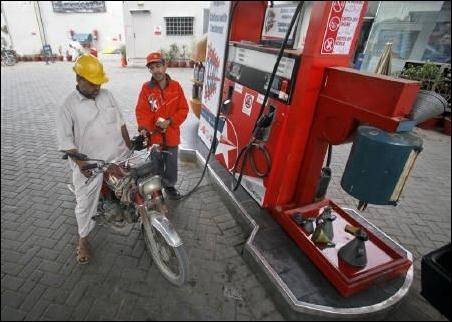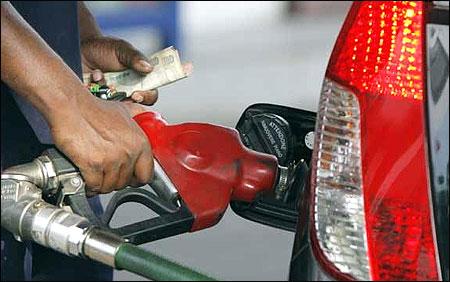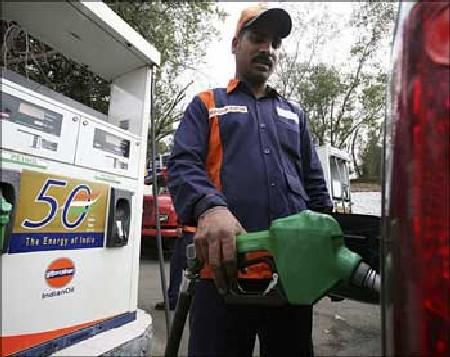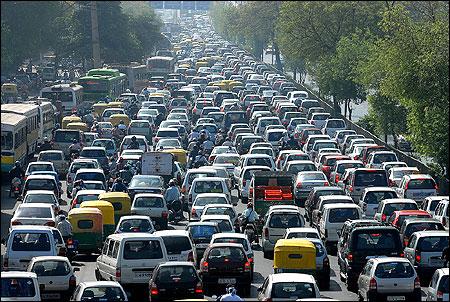 | « Back to article | Print this article |
Diesel to cost more, govt plans to deregulate prices
The government on Tuesday said it has agreed in-principle to deregulate diesel prices, but is not considering similar proposal for the cooking gas.
"The government has, in principle, agreed to make the prices of diesel market determined," Minister of State for Finance Namo Narain Meena said in a written reply to the Rajya Sabha.
While petrol prices are market-linked, the government fixes the rates of LPG, kerosene and diesel, which results in a large budgetary expenditure on subsidies.
"There is no proposal at present to fully deregulate cooking gas price," Meena said.
The Bharatiya Janata Party attacked the government for its in-principle decision to decontrol diesel prices even as Finance Minister Pranab Mukherjee said the move was decided in June last year but refused to specify whether it is being implemented.
"They (government) are saying that they are doing it in-principle and they will modulate it to the needs of the people. But this means that they are going to increase diesel prices and the diesel shock is coming in few days from now," BJP spokesman Prakash Javadekar said.
"What Kaushik Basu (PM's Economic Adviser) was saying and has indicated is now confirmed by government in its written reply also.
Click NEXT to read more...
Diesel to cost more, govt plans to deregulate prices
The minister said the government continues to fix the price of diesel in order to shield the common man from the impact of rising crude oil prices and the resultant inflation.
"In order to insulate the common man from the impact of rise in international oil prices and the domestic inflationary conditions, the government continues to modulate the retail selling price of diesel," Meena added.
Global crude oil prices have surged since the beginning of 2012 on account of geo-political concerns in the Middle East and abundant global liquidity. The price of Brent crude rose to $120 a barrel in mid-April from $111 in January.
Click NEXT to read more...
Diesel to cost more, govt plans to deregulate prices
For the current fiscal, the government has made a provision of Rs 43,580 crore (Rs 435. 80 billion) for oil subsidies, of which Rs 40,000 crore (Rs 400 billion) has been earmarked as compensation to oil marketing companies (OMCs) for selling petroleum products at lower than market rates.
During the 2011-12 fiscal, the government has paid Rs 65,000 crore to OMCs on account of under-recoveries, of which Rs 20,000 crore (Rs 200 billion) alone was for the January-March quarter.
High subsidies are putting pressure on the country's fiscal deficit, which touched 5.9 per cent of GDP last fiscal and is pegged at 5.1 per cent in 2012-13. India imports about 80 per cent of its crude oil requirement.
The government targets to bring down the subsidy bill to below 2 per cent of GDP this fiscal and 1.75 per cent in the subsequent years.
Diesel to cost more, govt plans to deregulate prices
BJP spokesman Prakash Javadekar said, "We oppose such a move because diesel is a basic fuel for all types of transport and that will have a cascading effect on price rise," he said outside Parliament House.
When asked about the move, Mukherjee said the decision was taken in June last year. "That decision was taken in June, 2011," he told reporters outside Parliament House.
The Minister, however, did not respond when asked whether the government would stick to its decision.
In a written reply in the Rajya Sabha, Minister of State for Finance Namo Narain Meena said, "Government has, in principle, agreed to make the prices of diesel market determined."
"In order to insulate the common man from the impact of rise in international oil prices and the domestic inflationary conditions, the government continues to modulate the retail selling price of diesel," Meena added.



